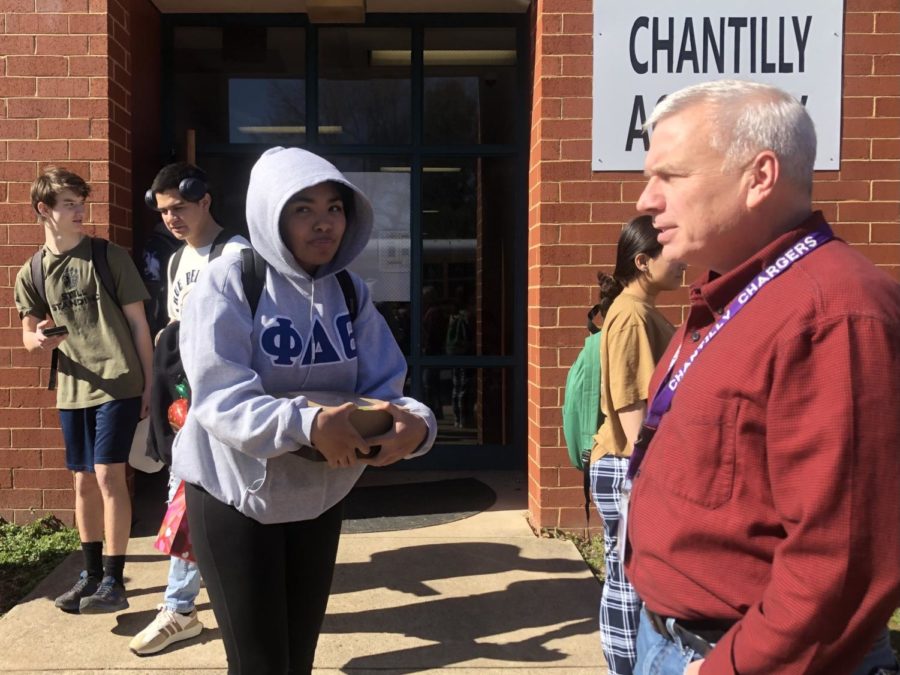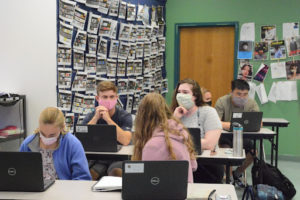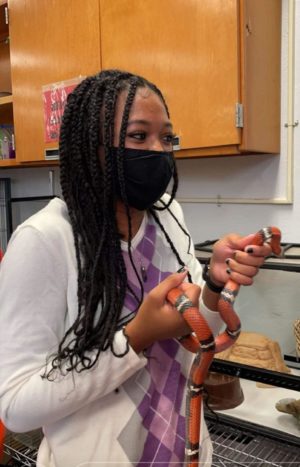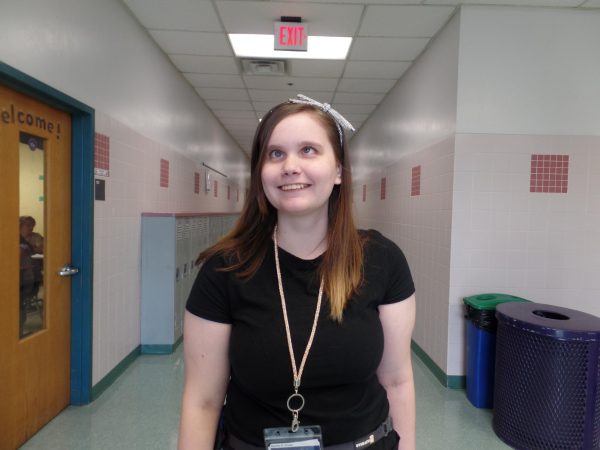Faculty employ skills from past careers
Academy counselor Sean McCoart converses with South Lakes High School junior Amariee Mayo while he supervises shuttle pickup on Feb. 15.
March 22, 2023
Many students cannot fathom choosing to work in schools for the rest of their professional lives, but sometimes education is the natural destination. Whether it be as a result of scheduling concerns or personality reasons, approximately 66% of teachers at CHS switched careers to work in the school system according to a poll taken on Feb. 10.
“I originally wanted to be a dentist,” science teacher Nina Kauser said. “I took a dental academy class in high school and absolutely loved it, and when I was at George Mason doing my undergrad in pre-dental, I applied to dentist school and didn’t get in. So then I applied to hygiene school and got in.”
Following the COVID-19 pandemic, Kause left dentistry to become a teacher. Not only does she enjoy helping to guide students who are interested in healthcare, but she finds the work day of a teacher offers her more time to spend with her young son.
From teachers to security, social workers to administrative assistants, 85.2% of staff switched careers to work in the public school system, according to the Feb. 10 poll.
When academy counselor Sean McCoart earned a bachelor’s degree in industrial organizational psychology from George Mason University, he elected to enter the workforce rather than pursue a master’s degree. He spent 20 years working for a local print and graphics company before he redirected his career path.
“I wasn’t exactly the perfect cut-out for sales,” McCoart said. “I really wasn’t motivated by money. I was more motivated by working with people. And so after 20 years, getting my son through college, on the trip home from my son’s graduation, my wife looked over at me and said, ‘Are you ready?’ And I said, ’Ready for what?’ And she said, ‘To quit your job and find a new direction.’”
Meanwhile, social studies teacher Joe Clement arrived at CHS after two career switches. He was a system administrator and worked in economic consulting before he arrived at teaching.
“I knew that those two were not for me so I was either going to go into a doctoral program for economics or I was going to get a forestry degree and go into the Peace Corps or I was going to become a teacher,” Clement said. “So I got into grad school for all of those and had to make a decision, and the more I learned about teaching, the more I wanted to give that a try. So I tried it and I’ve been here ever since.”
According to Kauser, she’s found that skills she learned from her time as a dental hygienist have proven necessary now that she’s a teacher. After honing her cooperation abilities in the dentist’s office, she now uses them in the classroom.
“A lot of patients come in scared from the dentist,” Kauser said. “They want certain things done a certain way and I feel like the public education system has become that way.”
Clement feels he’s carried a few things over to teaching from his previous careers. He attributes his work ethic and habits to his time as a consultant.
“In consulting, the hours are nuts, so when I got into teaching, I was not afraid of hard work or working way more than you are contracted to work,” Clement said. “In teaching, that is really important because a teaching day is only seven-and-a-half hours long, but if you’re going to do it well it requires a lot more than that. When you’re in consulting it’s all about decision making, and you make decisions all day long as a teacher.”
All three staff members believe they have found their place here and don’t foresee another career change in the near future. According to McCoart, he’s just meant for counseling. He says he finds CHS to be a much better fit both in community and in purpose.
“I like connection,” McCoart said. “I like trying to help. Everything that I learned in my master’s program was that a lot of those skills are just kind of innate in me: wanting to connect with people, listening, just reaching out and seeing if there’s an opportunity there for somebody to reach back to get a little bit of help or connection. I think it’s just kind of borne into me.”






